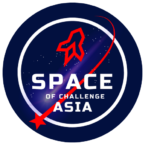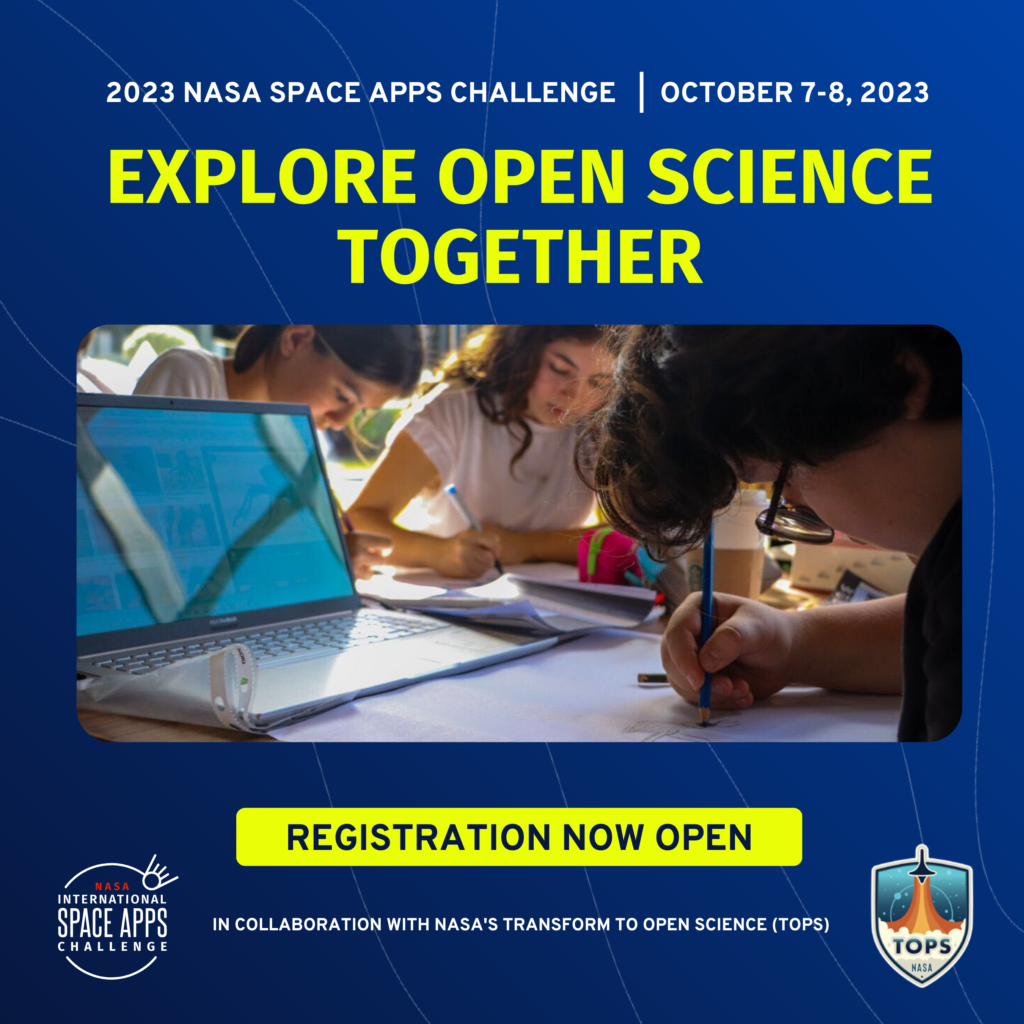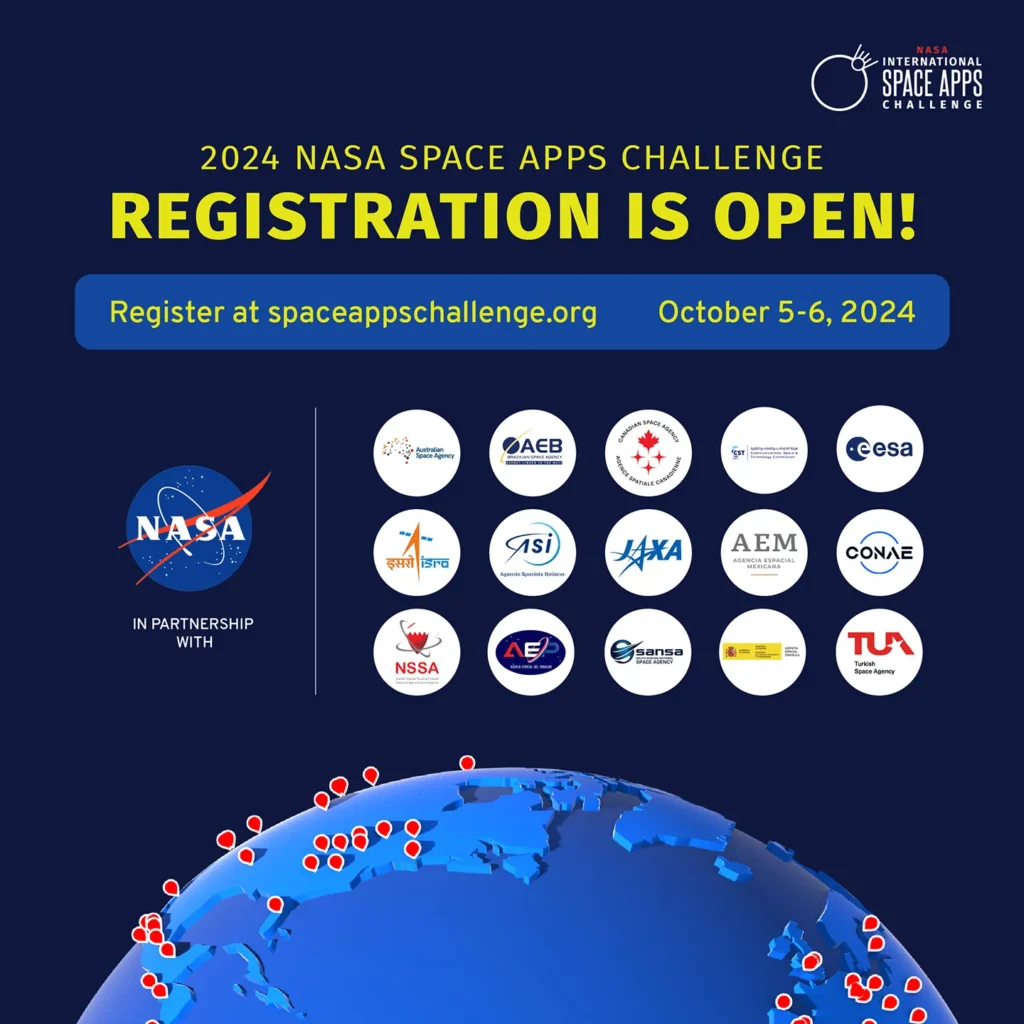Registration for the 2023 NASA International Space Apps Challenge—a global hackathon for coders and creatives, scientists and storytellers—is now open. The theme for this year’s event is “Explore Open Science Together,” and as participants will discover, the hackathon’s 30 challenges invite people from around the globe to come together and use the free and open data from NASA and its Space Agency Partners to solve the real-world challenges on Earth and in space. The NASA Space Apps Challenge starts on October 7 at 9:00 a.m. (local time) and ends on October 8 at 11:59 p.m. (local time), when project submissions are due. However, many Space Apps activities start before October 7. Once participants register for a Space Apps account and sign-up for a Local Event (or the Universal Event), they can begin checking their dashboard for important messages from the Space Apps Global Organizing Team about their hackathon journey. By participating in the Space Apps Challenge, team members learn about NASA’s data holdings and share in the creation and application of the knowledge that results from their efforts. This annual global hackathon encourages collaboration, creativity, and critical thinking, and leverages participants’ interest in space to foster the next generation of scientists, technologists, designers, science communicators, engineers, and global citizens. Launched in collaboration with NASA’s Transform to Open Science (TOPS) initiative, this year’s theme acknowledges 2023 as A Year of Open Science, as declared by NASA, the White House, and other federal agencies. The challenges comprising this year’s event are designed to broaden participation in science, increase accessibility to the free and open data available from NASA and its international partners, and encourage the use of new technologies that can help us respond to a variety of scientific questions. Some of this year’s challenges were developed in collaboration with NASA’s Earth Science Data Systems (ESDS) Program and utilize open data available through NASA’s Earth Observing System Data and Information System (EOSDIS). Among this year’s challenges are: A Marketplace for Open Science Projects, which challenges participants to create a solution that will help people who are looking for open-source projects to work on and project creators who need skilled contributors to find each other and communicate. Be a Space Geologist, which invites Space Apps Challenge teams to create an app that enables geologists to use NASA’s Earth observation data to conduct research. EMIT for the Future, which asks Space Apps Challenge teams to develop an app that can help raise community awareness of what NASA’s Earth Surface Mineral Dust Source Investigation (EMIT) mission is, how EMIT’s imaging spectrometer can be used, and what has already been accomplished with its mission data. GeoAI Reimagined: Transformative and Diverse Earth Science Applications Using Foundation Models, which challenges teams to develop an accurate and efficient artificial intelligence (AI) model (or models) for a range of critical geospatial applications, such as disaster recovery operations, environmental change monitoring (e.g., greenhouse gas detection and monitoring), geospatial data discovery, and more. International Space Station Earth-Observing Data VISION-aries Wanted, which tasks participants with expanding the functionality of an open-source web-based tool called VISIONS—Visible to ShortWave InfraRed Imaging Spectroscopy Interface for Open Science—to include more remote sensing platforms or enhanced features. Open Science Storytelling, which challenges teams to tell an open science success story in a creative way using any form of storytelling—from singing to poetry to dance to puppetry to acrobatics and beyond! NASA TOPS is also offering NASA Space Apps Challenge participants the opportunity to pre-enroll in their Open Science 101 training. This in-person or online training is designed to help scientists, researchers, and citizen scientists foster an open-science environment. Through five learning modules, Open Science 101 covers how to discover and access quality online resources, how to successfully communicate scientific findings, and how to format science in a way that others can incorporate into their research. Since its inception in 2012, NASA’s Space Apps Challenge has engaged more than 220,000 people from more than 185 countries and territories. In 2023, NASA is joined by more than a dozen international Space Agency Partners, including the Australian Space Agency, Brazilian Space Agency, CSA (Canadian Space Agency), ESA (European Space Agency), ISRO (Indian Space Research Organization), Italian Space Agency, JAXA (Japan Aerospace Exploration Agency), Mexican Space Agency, National Space Activities Commission of Argentina, National Space Science Agency of Bahrain, Paraguayan Space Agency, South African National Space Agency, and the Turkish Space Agency. This participation from NASA’s space agency partners around the world encourages more extensive global collaboration and provides a broader platform for participants to contribute to the fields of Earth and space science and technology through the NASA Space Apps Challenge. After the hackathon, project submissions will be judged by space agency experts and leaders to help select the NASA Space Apps winners. The final Global Winners will be selected to win one of 10 Global Awards in several categories, including Best Use of Science, Best Use of Data, Best Use of Technology, Most Inspirational, Best Storytelling, and more. The NASA Space Apps Challenge is funded by NASA’s Earth Science Division through a contract with Booz Allen Hamilton, Mindgrub, and SecondMuse. Learn More and Register For more information and to register for an in-person or virtual event, visit the 2023 NASA International Space Apps Challenge website at spaceappschallenge.org.



